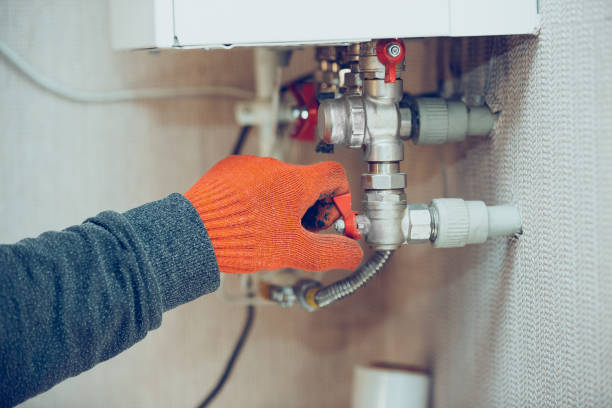My Conclusive Handbook to Dealing with Low Water Pressure in Your Home
My Conclusive Handbook to Dealing with Low Water Pressure in Your Home
Blog Article
We've stumbled on this article relating to 9 Reasons for Low Water Pressure in Your House directly below on the internet and felt it made sense to write about it with you over here.

Low water pressure in your home can be a frustrating problem, impacting every little thing from showering to washing meals. If you're experiencing weak water flow, there are numerous feasible causes and options to explore. In this guide, we'll talk about common factors for low water stress and sensible steps to address the concern efficiently.
Intro to Low Water Stress
Low water stress happens when the flow of water from your taps, showers, and other components is weaker than usual. This can make everyday jobs a lot more challenging and much less effective. Comprehending the root causes of low water stress is vital to discovering the right service.
Typical Reasons For Low Water Pressure
Pipe Obstructions
With time, pipelines can end up being clogged with natural resource, debris, or particles, restricting the flow of water. This is a common concern in older homes with galvanized steel pipelines.
Rust
Deterioration within pipelines can cause leakages and decreased water pressure. Rust buildup can restrict water circulation, specifically in maturing plumbing systems.
Faulty Stress Regulators
Stress regulatory authorities are responsible for maintaining consistent water pressure in your home. If they malfunction, it can result in low tide stress or uneven flow throughout your house.
Community Water System Issues
Sometimes, the trouble exists outside your home. Community water system issues, such as main line leakages or upkeep work, can momentarily minimize water stress in your location.
Just How to Detect Low Water Pressure
Examining Faucets and Components
Begin by checking the water pressure at different taps and fixtures throughout your home. If the concern is isolated to details areas, it might suggest local troubles.
Examining Pipelines
Evaluate noticeable pipes for signs of leaks, corrosion, or obstructions. Pay attention to any kind of uncommon sounds, such as banging or rattling pipelines, which can indicate concerns within the plumbing system.
Consulting with a Plumber
If you're not able to pinpoint the root cause of low water pressure, think about hiring a specialist plumber to conduct a comprehensive evaluation. They can recognize underlying issues and advise suitable services.
DIY Solutions to Repair Low Water Pressure
Cleaning Up Aerators and Showerheads
Mineral deposits can collect in aerators and showerheads, minimizing water flow. Eliminate and clean up these components consistently to enhance water stress.
Flushing Hot Water Heater
Sediment buildup in the hot water heater can restrict flow and lower efficiency. Flushing the container periodically aids remove debris and preserve optimum efficiency.
Inspecting Stress Regulatory Authority
Make certain that the pressure regulator is working properly. Readjusting or changing the regulator can assist recover appropriate water pressure throughout your home.
Clearing Clogs in Piping
For small obstructions, attempt utilizing a plumbing snake or chemical drain cleaner to clear obstructions in pipes. Be cautious when utilizing chemicals and follow safety guidelines.
When to Call a Professional Plumber
If DIY initiatives fall short to solve the issue or if you suspect significant plumbing issues, it's ideal to seek assistance from a qualified plumber. They have the proficiency and tools to resolve complicated concerns safely and properly.
Safety Nets to Maintain Water Pressure
Normal Maintenance
Schedule regular upkeep for your plumbing system to prevent issues such as rust, leakages, and blockages. Resolving minor troubles early can assist avoid more significant repairs later.
Setting Up a Pressure Booster
Consider setting up a pressure booster pump to improve water pressure in locations with regularly low flow. This can be specifically valuable for multi-story homes or buildings with high-demand components.
Surveillance Water Use
Bear in mind water usage practices and prevent overtaxing the plumbing system. Easy modifications, such as shocking showers and laundry tons, can aid maintain appropriate water pressure.
Conclusion
Managing low water stress can be irritating, yet determining the underlying causes and applying ideal options can restore ideal circulation throughout your home. Whether it's cleaning aerators, evaluating pipelines, or talking to a plumber, taking positive steps can make certain a consistent supply of water for your day-to-day needs.
FOUR WAYS TO FIX LOW WATER PRESSURE NOW
Turning on a shower or faucet only to find the water comes out in a sad, slow drizzle is never a good feeling. How exactly are you supposed to wash a pan or take a quick shower when it takes 10 minutes just to rinse off a little soap? The good news is that when your water pressure is bad, there's always a cause: typically one that can be easily fixed. Here are some of the most common causes of low pressure and what you can do to fix the issue:
DEBRIS AND MINERAL DEPOSIT BUILDUPS
If you notice low water pressure from just one or two of the fixtures in your house, the problem likely has to do with debris buildup. Water is full of minerals and other debris, all of which can accumulate in your pipes and on your fixtures. This can cause a blockage that affects how much water flows through. To fix this, try filling a small plastic bag with white vinegar, and use a rubber band to hang it around your showerhead or faucet. Let the head of the fixture soak for a few hours, and the vinegar should loosen the deposits.
WATER LEAKS
Leaks are another common cause of low water pressure. If water is flowing out of your plumbing through a hole or crack before it can reach your fixture, the pressure coming out of the faucet or showerhead will be lower. A plumbing professional is your best bet for finding and repairing a leak in your water supply pipes.
Leaks are another common cause of low water pressure. If water is flowing out of your plumbing through a hole or crack before it can reach your fixture, the pressure coming out of the faucet or showerhead will be lower. A plumbing professional is your best bet for finding and repairing a leak in your water supply pipes.
FOUR WAYS TO FIX LOW WATER PRESSURE NOW
Turning on a shower or faucet only to find the water comes out in a sad, slow drizzle is never a good feeling. How exactly are you supposed to wash a pan or take a quick shower when it takes 10 minutes just to rinse off a little soap? The good news is that when your water pressure is bad, there's always a cause: typically one that can be easily fixed. Here are some of the most common causes of low pressure and what you can do to fix the issue:
DEBRIS AND MINERAL DEPOSIT BUILDUPS
If you notice low water pressure from just one or two of the fixtures in your house, the problem likely has to do with debris buildup. Water is full of minerals and other debris, all of which can accumulate in your pipes and on your fixtures. This can cause a blockage that affects how much water flows through. To fix this, try filling a small plastic bag with white vinegar, and use a rubber band to hang it around your showerhead or faucet. Let the head of the fixture soak for a few hours, and the vinegar should loosen the deposits.
WATER LEAKS
Leaks are another common cause of low water pressure. If water is flowing out of your plumbing through a hole or crack before it can reach your fixture, the pressure coming out of the faucet or showerhead will be lower. A plumbing professional is your best bet for finding and repairing a leak in your water supply pipes.
Leaks are another common cause of low water pressure. If water is flowing out of your plumbing through a hole or crack before it can reach your fixture, the pressure coming out of the faucet or showerhead will be lower. A plumbing professional is your best bet for finding and repairing a leak in your water supply pipes.
A VALVE ISSUE
If you have low water pressure throughout your home, check your main shut-off valve to make sure it's completely open. You may also want to see if there's a pressure-reducing valve installed. If there is, have a plumber help you adjust the settings to get the pressure you're looking for.
OTHERS USING WATER
Believe it or not, your low water pressure could be caused by your neighbors. If you notice low pressure at certain times of day, it may be because you and the people living next to you have similar schedules - when everyone is showering at the same time, the pressure will be lower in every home. Low pressure throughout the neighborhood may also be caused by an issue with your municipal water supply. If that's the case, call the supplier to see if they're working on the issue.
https://www.rotorooter.com/blog/water-leaking/low-water-pressure-fixes/

Do you appreciate more info about ? Post a remark further down. We will be pleased to listen to your opinions about this article. In hopes that you visit us again later on. Are you aware of another person who is inquisitive about the topic? Take a moment to share it. Thank-you for taking the time to read it.
Contact Report this page